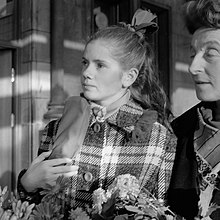Minou Drouet
Minou Drouet (born July 24, 1947 in Paris ; actually Marie-Noëlle Drouet ) is a French writer who caused an international sensation as a child during the 1950s with the publication of poems and letters as well as the heated controversy over the authenticity of these works.
biography
Minou Drouet was born an illegitimate child and given up for adoption by the birth mother . At the age of one and a half she was adopted by the tutor Claude Drouet and grew up in a small town near Rennes in Brittany . Due to a severe visual defect, she was almost blind in the first few years of life and lived in an almost autistic state. She eventually began to show an interest in music and considerable talent for playing the piano. Minou was accepted by a piano teacher at the Paris Conservatory , to whom she also wrote numerous letters. The teacher passed this on to the Parisian publisher René Julliard in 1955, who the year before had successfully published the novel Bonjour tristesse written by eighteen-year-old Françoise Sagan .
Julliard was delighted with the eight-year-old's literary talent. In September 1955 he brought out a collection of letters and poems by Minou Drouet in small editions and thus sparked a fierce literary controversy about the authenticity of the works, which led to the large volume of poems Arbre, mon ami (My friend, the tree) published in early 1956 Sales success.
The daily Le Figaro printed a very positive review. The women's magazine Elle , on the other hand, ran a series of articles accusing Minou's adoptive mother of having written the letters and poems and passed them off as her daughter's works. Many other publications and protagonists of cultural life felt compelled to take sides in the "Minou Drouet Affair", which Julliard described to the public as "a little Dreyfus affair ". The famous French writer, painter and director Jean Cocteau coined the judgment that has since been quoted again and again in this context: "All children have genius, except Minou Drouet."
Minou Drouet underwent several tests in which she had to put poems on paper on given topics under supervision without outside influence. In February 1956, she passed an entrance exam for the Société des auteurs, compositeurs et éditeurs de musique (SACEM). However, doubts about her literary talent should never be completely silenced.
After the success of her book, Minou appeared as a celebrity on various occasions. She made public music with Andrés Segovia , Pablo Casals , Jacques Brel and Charles Aznavour , performed at a gala event at La Scala in Milan , and had a private audience with Pope Pius XII in Rome . , made up at a meeting with Jean Cocteau, read from her poems and played the piano in nightclubs, theaters and arenas. In 1958 she played the lead role in the film Lost Game ( Clara et les méchants ), with Michel Serrault .
In the 1960s, the success gradually waned. After caring for her dying grandmother, Minou developed the desire to work as a nurse . After two years in a hospital, she returned to her appearances in clubs and cafes for some time. She was briefly married to the French humorist and singer Patrick Font.
In her early twenties, she published some less than successful children's books and fables and a novel. But in her later memoir Ma vérité (My Truth), Minou Drouet confessed that by then she had already lost the need to write.
In 1993 she married a workshop owner in her hometown and has lived in seclusion ever since.
Works
about Minou Drouet:
- L'Affaire Minou Drouet (André Parinaud, 1956)
from Minou Drouet:
- Arbre, mon ami (1957)
- Le Pêcheur de lune (1959)
- Du brouillard dans les yeux (1966) (German edition: Fog in the eyes, 1968)
- La Patte Bleue (1966)
- Ouf de la forêt (1968)
- La Flamme rousse (1968, illustrated by Daniel Billon)
- Ma vérité (autobiography, 1993)
literature
- Roland Barthes : Minou Drouet and literature . In: Myths of Everyday Life . Complete edition. Suhrkamp , Berlin 2010, ISBN 978-3-518-41969-4 , p. 199–208 (Original title: Mythologies . Translated by Horst Brühmann).
Web links
- Literature by and about Minou Drouet in the bibliographic database WorldCat
- Kitten on the Keys , article in TIME , Jan. 28, 1957
- A Lost Child , article by Robert Gottlieb in The New Yorker , November 6, 2006
- The remote-controlled child prodigy , article in Der Spiegel , February 15, 1956
| personal data | |
|---|---|
| SURNAME | Drouet, Minou |
| ALTERNATIVE NAMES | Drouet, Marie-Noëlle (real name) |
| BRIEF DESCRIPTION | French writer |
| DATE OF BIRTH | July 24, 1947 |
| PLACE OF BIRTH | Paris |
